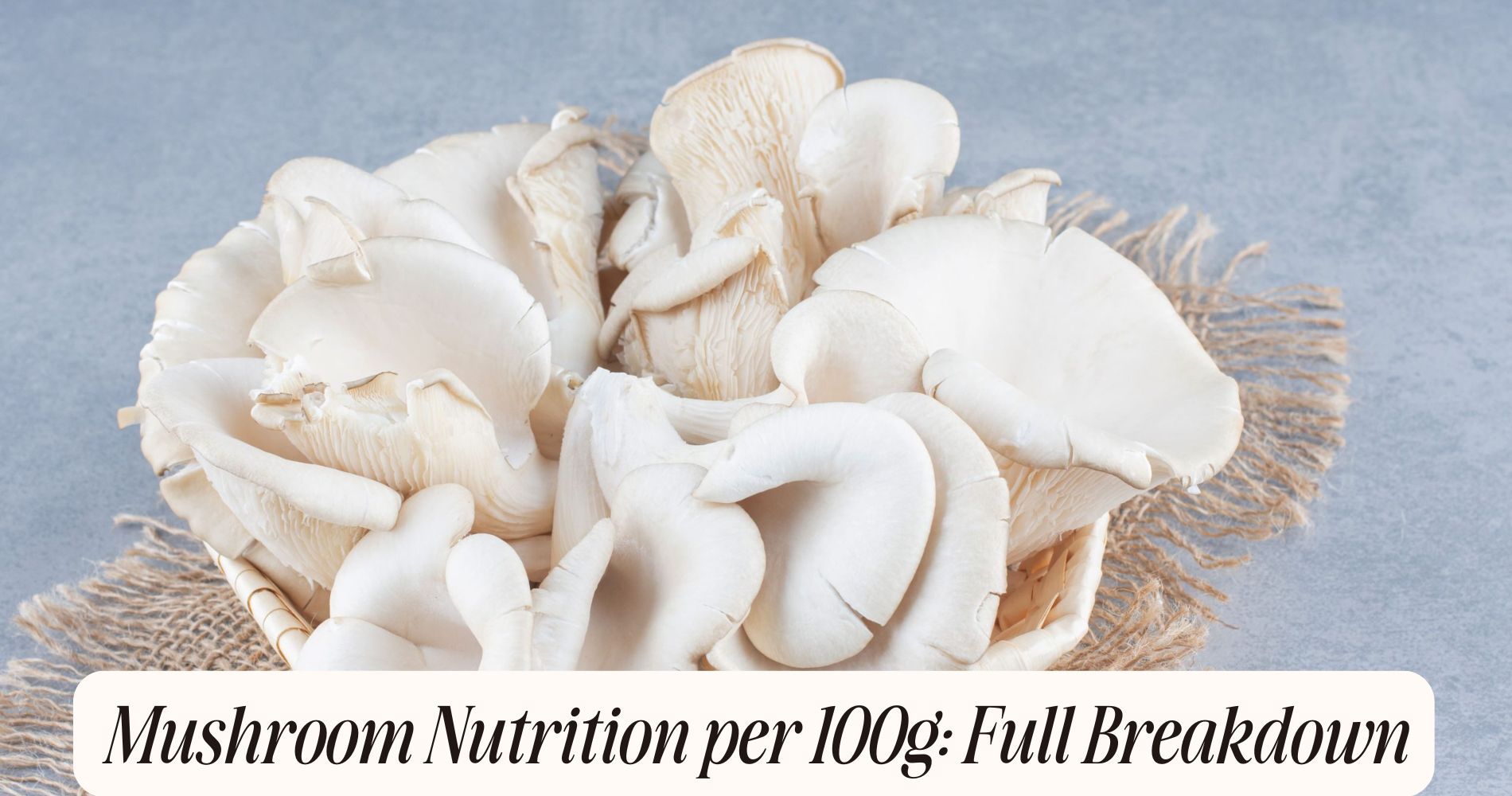
Mushroom Nutrition per 100g: Full Breakdown
Nutritional Overview of Mushrooms
When you consider the nutritional profile of mushrooms, you'll find that they aren't only low in calories but also packed with essential nutrients.
Different mushroom varieties, such as shiitake, portobello, and button mushrooms, offer unique benefits. For instance, shiitake mushrooms are rich in polysaccharides, which can enhance immune function, while portobellos provide a good source of potassium, essential for heart health.

Mushrooms also contain significant amounts of B vitamins, including riboflavin and niacin, which play a key role in energy metabolism. They're a rare non-animal source of vitamin D, especially when exposed to sunlight or UV light.
In culinary uses, mushrooms can enhance flavor profiles and textures in various dishes. You can sauté them, grill them, or use them in soups and sauces, making them versatile in your diet.
Their umami flavor can even serve as a meat substitute, appealing to vegetarians and vegans alike.
Calories and Macronutrients
Per 100 grams, mushrooms offer a remarkably low caloric content, typically ranging from 20 to 35 calories, depending on the variety. This low caloric density makes them an excellent choice for those looking to manage their weight while still enjoying flavorful foods.
When examining the macronutrient ratios, you'll find that mushrooms primarily consist of water, with carbohydrates being the dominant macronutrient. On average, mushrooms contain about 3 to 4 grams of carbohydrates, which include dietary fiber that aids digestion. Protein content ranges from 2 to 3 grams, while fat remains negligible, usually less than 1 gram per serving. This unique combination of low calories and favorable macronutrient ratios contributes to their status as a healthful food option.
Moreover, the high-water content of mushrooms not only enhances their culinary versatility but also helps you stay hydrated. Incorporating mushrooms into your meals can provide a satisfying texture and flavor without noticeably impacting your caloric intake.
For those mindful of their diet, mushrooms serve as a nutrient-dense option that supports overall health without adding excess calories.
Vitamins in Mushrooms
Packed with essential vitamins, mushrooms are a nutrient-rich food that can greatly contribute to your daily intake. They serve as excellent vitamin sources, particularly for B vitamins like riboflavin (B2), niacin (B3), and pantothenic acid (B5). These vitamins play significant roles in energy metabolism and overall cellular function.
Mushrooms also contain vitamin D, particularly when exposed to sunlight during growth. This vitamin is important for bone health and immune function, making mushrooms a unique plant-based source of this nutrient. Additionally, you'll find small amounts of vitamin C and vitamin K in certain varieties, which can further enhance their nutritional profile.

When it comes to cooking methods, how you prepare mushrooms can impact their vitamin content. For instance, steaming or sautéing mushrooms preserves more vitamins compared to boiling, which may lead to nutrient loss.
Roasting can also enhance flavor while retaining nutrients, but be mindful of cooking times to avoid overcooking.
Incorporating mushrooms into your diet through various cooking methods not only boosts your vitamin intake but also adds depth to your meals, making them a versatile and healthful choice.
Minerals Found in Mushrooms
Rich in essential minerals, mushrooms are an excellent addition to a balanced diet. They offer impressive mineral diversity, providing key nutrients like potassium, phosphorus, copper, and selenium.
Potassium plays a significant role in maintaining fluid balance, while phosphorus contributes to bone health and energy metabolism. Copper is essential for iron absorption and the formation of red blood cells, and selenium acts as an antioxidant, supporting immune function.
One noteworthy aspect of mushrooms is their iron content. Although mushrooms aren't the highest source of iron compared to red meat or legumes, they still provide a significant amount. For example, 100 grams of cooked shiitake mushrooms can deliver around 0.8 mg of iron, which is particularly beneficial for those adhering to vegetarian or vegan diets.
Consuming mushrooms can help you meet your daily iron requirements, especially when combined with vitamin C-rich foods to enhance iron absorption.
Incorporating a variety of mushroom types into your meals can maximize your mineral intake, contributing to overall health and wellness.
Antioxidants and Their Benefits
Mushrooms are rich in various types of antioxidants, which play an essential role in neutralizing free radicals in your body.
These compounds can help reduce oxidative stress, potentially lowering the risk of chronic diseases such as heart disease and cancer.
Understanding the specific antioxidants found in mushrooms and their health benefits can guide you in making more informed dietary choices.
Types of Antioxidants
Antioxidants play an essential role in maintaining cellular health by neutralizing free radicals, which are unstable molecules that can damage cells and contribute to chronic diseases.
There are several types of antioxidants, each with unique properties and benefits. Two significant categories include flavonoid compounds and carotenoid sources.
Flavonoid compounds are a diverse group of phytonutrients found in various fruits, vegetables, and mushrooms. They exhibit strong antioxidant activity, helping to protect cells from oxidative stress.

Common flavonoids include quercetin and catechins, which can be particularly beneficial for cardiovascular health and inflammation reduction.
Carotenoid sources, on the other hand, primarily include colorful fruits and vegetables like carrots, sweet potatoes, and spinach, as well as certain mushrooms.
Carotenoids, such as beta-carotene and lutein, not only provide antioxidant protection but also contribute to vision health and immune function.
Incorporating a variety of foods rich in these antioxidants into your diet can enhance your body's defense against oxidative damage, supporting overall health.
Health Benefits Explained
Incorporating antioxidants into your diet can greatly enhance your overall health by combating oxidative stress and reducing the risk of chronic diseases. Mushrooms are a rich source of these beneficial compounds, particularly ergothioneine and selenium, which play a significant role in neutralizing free radicals in your body.
By including mushrooms in your meals, you not only boost your antioxidant intake, but you also support your immune system. The unique combination of vitamins, minerals, and antioxidants in mushrooms has been shown to enhance immune cell function, potentially reducing the severity and duration of infections.
Moreover, antioxidants found in mushrooms contribute to heart health. They help lower inflammation and improve cholesterol levels, which are essential for maintaining cardiovascular function.
Studies suggest that regular consumption of mushrooms can lead to lower blood pressure and improved overall heart health, reducing the risk of heart-related diseases.
Dietary Fiber Content
Understanding the dietary fiber content in mushrooms is essential for your health.
Fiber offers numerous benefits, including improved digestion and heart health, while mushrooms serve as a valuable source.
The recommended daily intake of fiber can be met effectively by incorporating mushrooms into your diet.
Health Benefits of Fiber
Dietary fiber plays an essential role in promoting digestive health and overall well-being. Incorporating adequate fiber into your diet can enhance gastrointestinal function, helping to prevent constipation and reduce the risk of developing conditions such as diverticulitis and colorectal cancer.
Soluble fiber, found in various fiber sources, can help regulate blood sugar levels and lower cholesterol, contributing to cardiovascular health.
When you consume fiber-rich foods, you also promote a healthy gut microbiome. The fermentation of soluble fiber by gut bacteria produces short-chain fatty acids, which have anti-inflammatory properties and support immune function.
Additionally, fiber can increase feelings of fullness, aiding in weight management by reducing overeating.
Maintaining a balanced intake of dietary fiber is vital for your overall health. The recommended daily intake is about 25 grams for women and 38 grams for men, but most people fall short.
By including a variety of fiber sources in your meals, like fruits, vegetables, whole grains, and legumes, you can easily meet these recommendations.
Fiber Sources in Mushrooms
Mushrooms are a surprisingly rich source of dietary fiber, contributing considerably to your daily intake. With approximately 2.3 grams of fiber per 100 grams, they offer a unique blend of fiber types, including both soluble and insoluble fibers.
Soluble fiber, found in mushrooms, can help regulate blood sugar levels and enhance gut health by promoting the growth of beneficial bacteria. Insoluble fiber, on the other hand, aids in digestive health by adding bulk to your stool and facilitating regular bowel movements.

Common fiber sources in mushrooms include beta-glucans, which are known for their immune-boosting properties, and chitin, a structural polysaccharide that contributes to the fibrous structure of the mushroom cell wall.
These fibers not only enhance your overall fiber intake but also provide various health benefits, such as reducing cholesterol levels and improving satiety.
Including a variety of mushrooms in your diet can diversify your fiber sources, ensuring you get a range of health benefits. Plus, they're versatile enough to be included in numerous dishes, making it easy to boost your fiber consumption while enjoying delicious meals.
Recommended Daily Intake
For ideal health, it's vital to meet the recommended daily intake of dietary fiber, which varies by age and gender. Generally, adults should aim for about 25 to 38 grams of fiber daily, depending on their specific needs. This intake supports digestive health, helps maintain a healthy weight, and reduces the risk of chronic diseases.
Mushrooms are a beneficial source of dietary fiber, particularly in their serving size. For instance, 100 grams of cooked mushrooms can provide approximately 1 to 3 grams of fiber, depending on the variety. Including mushrooms in your diet can contribute to your daily intake goals, especially when combined with other fiber-rich foods like fruits, vegetables, and whole grains.
To effectively increase your fiber intake, consider incorporating mushrooms into meals regularly. Whether you're adding them to salads, stir-fries, or soups, their versatility makes it easy to boost your fiber consumption.
Protein Quality in Mushrooms
When evaluating the protein quality in mushrooms, it's important to recognize that they offer a unique amino acid profile compared to traditional protein sources. While mushrooms contain protein, they typically provide lower amounts than meat, dairy, or legumes. However, they do contain essential amino acids, making them a valuable addition to a balanced diet, especially for vegetarians and vegans.
The protein in mushrooms is considered high-quality due to its digestibility and the presence of various amino acids that support bodily functions. For instance, mushrooms contain glutamate and aspartate, which play essential roles in neurotransmission and energy metabolism.
While they may lack some essential amino acids, such as lysine, incorporating them with other protein sources can help achieve a complete amino acid profile.
Mushrooms also contain bioactive compounds that may enhance protein synthesis and overall health. For those looking to diversify their protein intake, mushrooms can serve as a complementary source, particularly when combined with grains or legumes.
Therefore, understanding the protein quality in mushrooms can help you make informed dietary choices and optimize your nutrition.
Health Benefits of Mushrooms
Incorporating mushrooms into your diet not only enhances protein intake but also offers a multitude of health benefits. Various mushroom varieties, such as shiitake, reishi, and maitake, are known for their unique medicinal properties. These fungi are rich in essential vitamins, minerals, and antioxidants, contributing to overall health.
Mushrooms are particularly noted for their immune-boosting effects. Compounds like beta-glucans found in different mushroom varieties enhance the body's immune response, helping to fend off infections.

Additionally, the presence of vitamin D in mushrooms can support bone health and improve mood, especially when they're exposed to sunlight during growth.
Moreover, some studies indicate that certain mushrooms possess anti-cancer properties. For example, the reishi mushroom has been shown to inhibit tumor growth and promote apoptosis in cancer cells.
The anti-inflammatory effects of mushrooms can also help manage chronic conditions, such as heart disease.
Incorporating a variety of mushrooms into your meals not only diversifies your diet but also harnesses their health-promoting benefits. By doing so, you can enhance your overall well-being while enjoying their unique flavors and textures.
Get the Benefits of Mushroom Nutrition with Well Gummies SUPER MUSHROOM GUMMIES
Understanding mushroom nutrition per 100g is a great start to improving your health, but why not make it even easier? Well Gummies SUPER MUSHROOM GUMMIES deliver the power of ten functional mushrooms in a convenient, delicious gum chew. These vegan gummies are packed with nutrients to fuel your brain, enhance focus, and support immune health—all without the need for meal prep.
Enjoy the wild berry flavor that tastes like candy, with no jitters or crashes. A simple, tasty way to incorporate the best of mushroom nutrition into your daily routine. Try Well Gummies today!
Frequently Asked Questions
Are There Any Mushrooms That Are Toxic to Humans?
Yes, some mushrooms are toxic to humans. Proper mushroom identification is essential, as toxic species can resemble edible ones. Always research thoroughly or consult experts before foraging to avoid dangerous, potentially life-threatening mistakes.
How Do Different Cooking Methods Affect Mushroom Nutrition?
Different cooking techniques greatly affect nutrient retention in mushrooms. Steaming preserves most vitamins, while frying can reduce them. Choosing the right method guarantees you maximize the nutritional benefits while enjoying the unique flavors of mushrooms.
Can Mushrooms Help With Weight Loss?
Mushrooms can aid weight loss due to their low calories and high dietary fiber content. Certain mushroom varieties, like shiitake and portobello, promote satiety and help regulate appetite, making them a smart addition to your diet.
Are There Specific Mushrooms Recommended for Athletes?
Yes, certain mushrooms, like cordyceps and reishi, offer performance benefits and recovery enhancement. They can improve endurance, reduce fatigue, and support immune function, making them excellent choices for athletes aiming to optimize their training and recovery.
How Should Mushrooms Be Stored for Optimal Freshness?
To store mushrooms for ideal freshness, use breathable containers, like paper bags. This method extends their shelf life, preventing moisture buildup. Avoid airtight packaging to reduce spoilage and maintain their quality longer.
Conclusion
Incorporating mushrooms into your diet offers a wealth of nutritional benefits. With low calories and a rich profile of vitamins, minerals, and antioxidants, they can enhance overall health. Their dietary fiber supports digestion, while their unique protein quality contributes to muscle maintenance. By understanding mushroom nutrition, you can make informed dietary choices that promote well-being. Embrace the versatility of mushrooms to boost your meals and reap the health benefits they provide.




